| Author |
 Topic Topic  |
|
|
|
sarifah
Junior Member

30 Posts |
 Posted - 01 Apr 2009 : 8:03:57 PM Posted - 01 Apr 2009 : 8:03:57 PM




|
We are in a bit of a dilemma. We have found a lovely place for all the family - including the horses. Nice house, lovely stables and 15 acres of land and all for very good money. Were on the point of signing contract but then found out that last year 2 horses died on that very land from grass sickness. What are the chances that will happen again? Who knows more about it? Help PLEASE!!!!!
Thanks
Marianne
|
|
Report to moderator
|
|
|
BeckyBoodle
Gold Member
   

Australia
795 Posts |
 Posted - 01 Apr 2009 : 8:20:33 PM Posted - 01 Apr 2009 : 8:20:33 PM




|
I would be quite careful. Do you know if they have identified particular areas?
It is quite hard to treat and often fatal. Somewhere I used to have a loan horse had two whole fields they wouldn't use as two horses had gone down with grass fever - both fatalities.
It typically effects younger horses, earlier on in the year and often when they are new to the area, ie just moved to the yard - I think there are thoughts that older horses can deal with the toxins better or have built up a resistance. I am sure one or two of the horsey mags just out cover the topic, so will see if I still have them lying around.
B
|
Report to Moderator  |
|
|
Pauline
Platinum Member
    

England
3185 Posts |
|
|
Birthe
Bronze Member
 
Denmark
73 Posts |
 Posted - 01 Apr 2009 : 8:29:50 PM Posted - 01 Apr 2009 : 8:29:50 PM




|
Dear Marianne
I had a gelding who died as a 2-years old from grass sickness. We put new grass on some of the fields (I donīt know how to say it in english, Iīm from Denmark)and nothing has happend since. But you canīt be sure that is was the grass (just because it is called grass sickness), my vet. told me it could be boutolism (and he only got hay)or just the right (or should I say wrong) circumstances who did it. But still - they say, that if it has appeared in one area there is a big risk it will happen again.
I hope you understand, I am to tired to look for the right spelling 
But I understand your worry, I would have it too! Grass sickness is the worst thing I have seen. No horse deserves this...
Best regards, Birthe |
Report to Moderator  |
|
|
bexr
Gold Member
   

England
818 Posts |
 Posted - 01 Apr 2009 : 9:21:48 PM Posted - 01 Apr 2009 : 9:21:48 PM




|
DO NOT put your horses on this field.
Once a field has thrown up Grass sickness, it will again. My section A was diagnosed with Sub-acute grass sickness, on the operating table at Leahurst, and PTS.
He was on loan, so in a different field, with 3 others. The first sign was he was laid on his hay. Over the next week he needed stomach tubing, as he was unable to drink. His stomach became bloated, he was unable to poo. He went from been perky, to laying out flat. Although he was not colicing, he had a high pulse.
He DID NOT loss weight, instead became more and more bloated.
The cases that do go to skin and bone, but keep eating alittle, and can pass muck, have a slim chance of survival.
All the other horses were fine.
Even though it has been 9 years, it is still a condition, I dread the most. |
Bex |
Report to Moderator  |
|
|
s.jade
Platinum Member
    

United Kingdom
2401 Posts |
 Posted - 01 Apr 2009 : 9:32:26 PM Posted - 01 Apr 2009 : 9:32:26 PM






|
Grass sickness can happen anywhere, to any horse.
We have lost 5 in the past 4 years, having been on our grazing for over 20 now - none before this.
It's not just grass.
Look at Dubai Millennium....not on any grass, and he still died of this awful disease.
Ours have all been acute cases, and despite the guidelines of those most susceptible/time most susceptible - i.e. 4-10yrs old, more mares, March-September, after a stressful event (as told to us by our vet and Liverpool Equine dept) we lost an 18yr old mare on XMas eve just gone, a 30yr old mare last June, and a friend lost an 8month old colt in November.
Advice to us was make sure hay is available 24/7/365 - even if just an armful a day.
I am lucky, I have a survivor . She is 16 now but after spending months hospitalised, it took her almost 2 years to get back to full health, and she will never hold weight as she did before, always looks racing fit and run up at her belly - but is very happy with life. . She is 16 now but after spending months hospitalised, it took her almost 2 years to get back to full health, and she will never hold weight as she did before, always looks racing fit and run up at her belly - but is very happy with life.
|
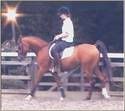 |
Report to Moderator  |
|
|
RiffRaff
Silver Member
  

271 Posts |
 Posted - 01 Apr 2009 : 9:57:17 PM Posted - 01 Apr 2009 : 9:57:17 PM




|
| Very difficult situation we lost a horse due to grass sickness, it all happened within 24hrs! Went from being a normally healthy horse to a walking skeleton colicking and had to be put down as system just completly shut down it happened so quickly! He was mid teens not what i call old but not young. Been para noid it will happen again but touch wood (dont actually want to say it) and its been six years. But then i have heard others that have had two/three cases on the same land. Unfortunatly i still think its something thats unexplained and still not completly understood so i think its going to be a hard decision. Sorry probably not much help |
Report to Moderator  |
|
|
BeckyBoodle
Gold Member
   

Australia
795 Posts |
 Posted - 01 Apr 2009 : 10:18:34 PM Posted - 01 Apr 2009 : 10:18:34 PM




|
Found the article.
Not proven, but thought to be a disease caused by Clostridium bacteria, which causes nerve damage causing a degeneration of the involuntary nervous system. Basically the gut stops working. Often has fatal results
Risk factors:-
Age - mostly horses age 2-6 (not foals, may have maternal protection). Possibly have less immunity.
Weight - horses in good condition or overweight most susceptible.
Location - particular fields. however, grazing with sheep and cows may reduce the risk. Apparently ruminants may ehlp to remove the botulinum from the grass.
Season - mainly happen in Spring and early summer - but associated with cooler weather not hot.
Movement - ie if new to the land. May be because of change in gut flora.
Signs - tucked up and standing with a narrow base ie front legs back, back legs forward.
Prevention tactics
avoid bringing young horses to the area in spring/early summer.
Stable horse for part of the day and feed hay so that grass is not their main source of food.
Hope this is of use.
B
|
Report to Moderator  |
|
|
sarifah
Junior Member

30 Posts |
 Posted - 01 Apr 2009 : 10:24:10 PM Posted - 01 Apr 2009 : 10:24:10 PM




|
thanks so much for all your answers - lots to think about. Still do not know what to do.
Marianne |
Report to Moderator  |
|
|
LIV
Gold Member
   
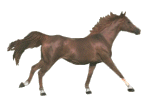
England
705 Posts |
 Posted - 02 Apr 2009 : 07:37:51 AM Posted - 02 Apr 2009 : 07:37:51 AM




|
Hi
I lost my mare over ten years ago now to grass sickness when she was seven years old. She appeared to have colic but my vet very quickly realised it was more than that and within a couple of hours we took her to an equine clinic in Newmarket. She was PTS the next day as she had become paralysed from her oesophagus to her rectum. A few days later three horses at the livery yard that adjoins our land came down with it. One survived but was never the same again.
That was all about twelve years ago now and the land is still grazed by horses that are more susceptible (i.e. age range) but it has never happened since. I was given the same advice about putting out hay to limit their need to graze at the times they are most at risk. I think there is more chance of them getting laminitis or breaking a leg in the field than getting grass sickness, and who's to say that if you move them from that land to new grazing that they're not going to get it there.
Liv
|
     
|
Report to Moderator  |
|
|
NatH
Platinum Member
    

England
2695 Posts |
 Posted - 02 Apr 2009 : 10:51:00 AM Posted - 02 Apr 2009 : 10:51:00 AM




|
| I would contact the Grass Sickness folks, they'll be able to advise you. |
Natalie
Chapel Lane Arabians
    |
Report to Moderator  |
|
|
Joto
Gold Member
   
855 Posts |
 Posted - 02 Apr 2009 : 12:59:20 PM Posted - 02 Apr 2009 : 12:59:20 PM




|
http://www.grasssickness.org.uk/
please go to this web site then contact the grass sickness experts there with your questions.
personally i wouldn't move my horses to somewhere where i know there have been cases. a few years ago I lost three arabs, aged 2 yrs 7 yrs and 9 yrs. a neighbouring farm lost a 2 yr old palomino colt and next door the other way a 14 yr old gelding. all within about 6 months. it was horrific.
I moved away with my remaining horse. PM me if you want to know the locality. |
Report to Moderator  |
|
|
Montikka
Platinum Member
    

United Kingdom
2653 Posts |
 Posted - 02 Apr 2009 : 2:09:31 PM Posted - 02 Apr 2009 : 2:09:31 PM





|
We nearly lost a pony to grass sickness - typical acute case: found him in field almost sitting like a dog. No poo, patchy sweating on neck, couldn't eat or drink, absolutely skeletal within days. We back-raked him and fed sloppy wet bread (having tried EVERY feed on the market). He was fed this way every two hours day and night. The vet (Stuart Hastie) practically moved in. It took two weeks to get him on the road to recovery and he wenton to do pony club etc.
Now he was classsic in that he'd just moved to us, was aged 3 and it happened in May.
We have had seven other horses on this field with no problems, now someone else uses it and has three out there, still without incident.
It is the most harrowing disease to witness, personally, I'd avoid the field.
Contact the Moredun Institute.
As Joto says, PM if you need to know where. |
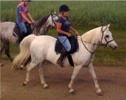 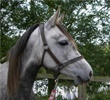  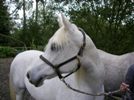
Louise, Warwickshire |
Report to Moderator  |
|
| |
 Topic Topic  |
|

